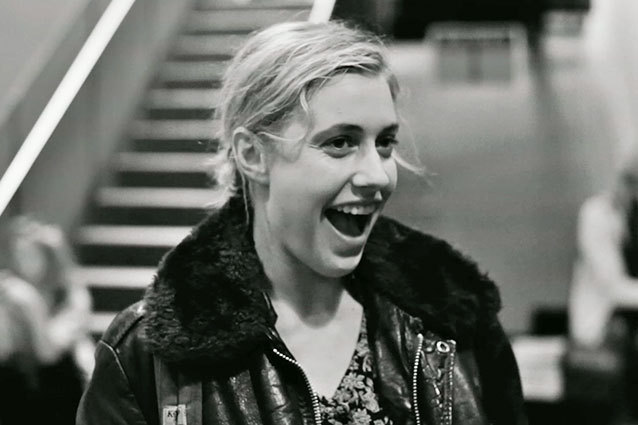CGS’s “Drone Poetics,” or, my desire to be unobtrusive
Up at the Boston Review blog, Carmen Gimenez Smith gives real talk about being a poet-academic and the inherent privilege of it:
I often struggle with how I might best use the privilege I possess as a middle-class poet. I’m afforded the platforms of professor and writer, platforms I don’t really utilize to effect change in the world. This might be due to a cultural indoctrination suggesting that poetry is a marginal practice, yet poets such as Adrienne Rich, Denise Levertov, Gary Snyder, Brenda Hillman, and, more recently, Mark Nowak, Shane McCrae, Jena Osman, and Craig Santos Perez have utilized their privilege and platform to uncover, expose, and counter accepted narratives about living in a declining empire in which our agency as citizens is shrinking. While the government watches us, more and more poets and writers are watching back, documenting the injustices that stain our present moment. We need more of that. I should be doing that.
I’m currently editing this massive anthology with Joshua Marie Wilkinson called The Force of What’s Possible: Writers on the Avant-Garde and Accessibility (heading to an Internet purchasing place near you in 2015 from Nightboat Books). In it, we have roughly 100 original essays discussing the role of accessibility in writing as well as Badiou’s questioning of Empire and recognition. Putting together these essays, especially in light of Carmen’s BR post, I keep returning to a word: responsibility. What responsibility do we have as writers? Do we have a responsibility? To whom? Should we even care about accountability? And accountable to whom? We have this great power: the ability to tell stories. What do we do with it? Do we just recycle the same and call it new?
Why Frances Ha Is a Cowardly Movie
Instead of attending an opening for a collective of internet/new media artists in Red Hook, probably cutting edge, funny, with free alcohol—perhaps some level of thought-provoking, also maybe I would’ve known some people there—I decided to go see Francis Ha. Something said it was like Baumbach meets Girls, and since Lena Dunham and the aforementioned filmmaker (whose notoriety is mainly based on a 2005 family drama and his friendship with the more marketable and visually stylistic Wes Anderson) both, in the shallow arc of their careers, mark an acme of New York indie-cum-commercial, I figured I’d get more pleasure and cultural experience out of going to the movies. I’ve always been attracted to the medium’s commercial roots: the amount of money it takes for a 90-minute feature to be made: the amount of money it costs to finance advertising: the amount it costs to see it once in theaters. Counteracted against the mutable possibilities for distribution and audience now made possible by the internet. It’s a weird time to consider one’s self an artist making movies, probably. Weirder than posting photos of a MacBook in a bathtub to a Tumblr.
Even weirder to film your movie in black and white. A bold choice, it actually succeeds, raw and captivating rather than kitschy and meaningless. Baumbach creates a Manhattan-like air to parts of the city heretofore unexplored in traditional analogue (i.e., Brooklyn). Its passé, but really more pastiche, approach to the cinematography feels enhanced by the literal quality of the film print. I don’t really know how that works, but certain moments feel faster, like World War II footage or old home movies. Frances (Greta Gerwig) runs down the crosswalks of lower Manhattan to “Modern Love” dancing and sort of fluttering. It’s not dramatic; it’s comic and natural and sort of frantic.
And that’s how the majority of the film is. People in their mid-20s banter and talk around ideas (and the dialogue is good, not parodic, not pandering or striving to capture some extant zenith of hipster inflection). Everyone wants to be an artist, but nobody really cares or knows how. Frances, an aspiring modern dancer and graduate of Vassar, traverses six shared, and unsuitable, residences, not including a 48-hour stint at a friend of an acquaintance’s apartment in Paris, over the course of maybe eighteen months. She fails at relationships, she sulks and hopes and talks like an intelligent person who doesn’t care about being intelligent. Someone at a dinner party says something like, “Sophie—she’s really smart,” to which Frances replies something like, “Well, yeah, we’re all smart.” She claims her friend doesn’t read enough, but we only see the protagonist flipping through the center of some thick book, ostensibly Proust, on one of her countless wasted days.
Frances is wildly unmotivated and expects a natural progression of success in the art world from minimal, obligatory efforts. She has basal talent, illusory goals and lots of beer. And she gets drunk a lot, fractiously speaking down paths of unrelatable and undetectable revelation amongst people either too mature for her company or just as immature and wanton, but rich. Frances isn’t rich. By economic and social terms, she is absolutely poor, but addressing the harrowing nature and implications of this situation becomes increasingly difficult, as she admits, when confronted by her vague love interest and roommate, that she cannot be poor, essentially because she is educated, art-minded and white. The story really does seem beautiful. It is more honest and intense than Girls, more willing to quietly face the complications of inheriting a broken economy, a feeling and system of entitlement, privilege and unwarranted desire. Nothing could really be more current, topical, desperately vital to address.
Oh god, I’m so sad. Frances Ha comes so close.

